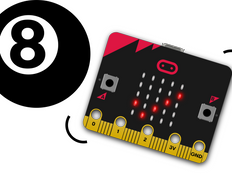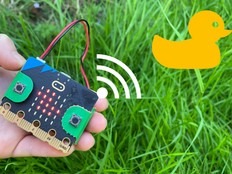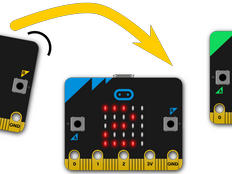Paso 1: Hazlo
¿Qué es?
Juega a este clásico juego con dos micro:bits y aprende a la vez sobre selección, variables y números aleatorios.
Estos dos vídeos te enseñarán qué vas a hacer y cómo programarlo:
Introducción
Guía de programación
Cómo funciona
- Piedra, papel y tijeras es un juego clásico de azar para dos personas. Tú y un compañero agitan los puños 3 veces y luego haces gestos al azar para mostrar una piedra, papel o tijera. La piedra gana a las tijeras, las tijeras al papel y el papel a la piedra (¡envolviéndola!)
- Cuando el acelerómetro del micro:bit detecta una sacudida, establece la variable "tool" (herramienta) a un número al azar: 0, 1 o 2.
- Usamos 0 porque los ordenadores empiezan a contar en cero, ¡y de paso recordamos que el 0 es un número igual que cualquier otro!
- El programa utiliza selección para decidir qué imágen mostrar en la pantalla LED. Si el número era 0, muestra una el icono de una piedra. Si era un 1, muestra un icono representando al papel. Si no era ni 0 ni uno, debe ser 2 porque le hemos indicado al micro:bit que sólo genere números aleatorios entre 0 y 2, así que mostramos unas tijeras.
Lo que necesitas
- 2 micro:bits (o simulador MakeCode)
- Editor de MakeCode o de Python
- pilas (opcional)
- un compañero con el que jugar
Paso 2: Prográmalo
Paso 3: Mejóralo
- Dibuja tus propios iconos para la piedra, el papel y las tijeras.
- Piensa en otras herramientas que reemplacen a la piedra, el papel y las tijeras; o invéntate unas nuevas reglas.
- Haz una versión que utilice la radio del micro:bit para comunicarse con el de tu amigo y saber si has ganado o has perdido.
This content is published under a Creative Commons Attribution-ShareAlike 4.0 International (CC BY-SA 4.0) licence.


